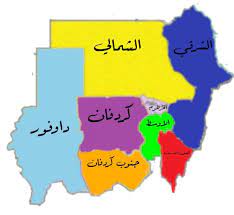
Division of Sudan... Does It End the War?
Khartoum - moatinoon
It seems that neither the international community nor the initiatives of the States of the region from Jeddah to Addis Ababa have heard the parties to the conflict in the Sudan. The absence of monitoring mechanisms, the prolongation of the war and its catastrophic damage, and the continued impunity of human rights violators in the Sudan for nearly four decades have encouraged the outbreak of the April 15 war against unarmed civilians. There have been massive violations of international humanitarian law from the second day of war to the moment, with thousands killed, hundreds raped, millions displaced, health and service institutions destroyed, and water, electricity and communications cut-offs.
The parties to the conflict had exchanged statements over the previous two days, with Rapid Support Leader Mohamed Hamdan Dagalo responding in an audio recording to General Burhans consultations with the formation of a caretaker government based in Port Sudan, eastern Sudan, with the formation of a civilian authority based in Khartoum.
UNTAMS, for its part, stated in a press release that it had maintained close contact with the army and rapid support; to urge them to commit themselves seriously to a ceasefire and to move towards a permanent cessation of hostilities.
In a swift reaction, FFC said it was following with grave concern the escalating indications that both sides of the war were waving a government in their positions of control, which would result in the countrys fragmentation and division.
Based on its historical and national position, it reiterated its total rejection of this trend, which sows the seeds of fragmentation of the unity of the Sudan, deepens the conflict and widens the cycle of war in preparation for its transformation of a comprehensive civil war, according to a statement issued on Friday.
The Statement of Freedom and Change stressed that since the coup d �tat 25 October 2002, no one in the Sudan has been legitimate to form any Government. According to the foregoing, FFC will take a number of steps to address the plans for the partition of the country and work towards stopping it under the heading of direct and immediate communication with the armed forces and rapid support, with a view to urging them to avoid any current or future steps leading to the tearing up of the country and the continuation and escalation of the war and its further spread. and we will encourage them to sit down to negotiate to stop the war and address the catastrophic humanitarian situation.
FFC said it would intensify its engagement with political and civil forces in order to build the broadest civil front against war and preserve the unity of the Sudan, calling on the international community to work hard for the parties to reverse the evolution of the course of war and invite them to play a positive role that would accelerate the end of this absurd war and restore the path of democratic civilian transition.
By harnessing all its possibilities and tools for its political, diplomatic and media work in order to preserve the countrys unity, integrity, freedom and security, we bet on the awareness of the masses and its gains achieved by the glorious slogans of the December Revolution.
The Khartoum war is entering its sixth month with thousands of deaths, tens of thousands of wounded and dozens of documented rapes, mostly by the Rapid Support Forces (RSF), airstrikes on homes and public facilities and civilians by the Sudanese army, occupation of civilian homes by RSF and theft of their property. According to analysts, the attack on civilians by the army, the rapid support and the narrowing of civilian space, all carried out by forces supposedly responsible for protecting Sudanese soil, allocated resources and raped some of them on the pretext of protecting Sudanese citizens.
During the months of the war, more than 5 million Sudanese were displaced from their areas, 4 million inside the Sudan and 1 million more outside the Sudan. For the first time in the Sudans history, schoolchildren were unable to sit the Sudan certificate exam, and education life was completely disrupted without any prospect of resuming schooling. In Khartoum state, more than 70% of hospitals and health centres have been disrupted, according to the latest authorization of the Federal Minister of Health. National drug factories that provide more than 40% of the countrys need for the drug have been disrupted and the movement of the drug import has been significantly disrupted.
The summer agricultural season faces significant if not already failed problems. There are still insufficient solutions and preparations for the winter season. With the United Nations estimating 25 million Sudanese in need of humanitarian assistance at the start of the war, major problems confront food security and provide basic services to citizens.
With all this suffering there are those who view this war as a necessity and must continue, and with all these crimes and violations there are those who support war leaders or at least do not view them as criminals who must be brought to justice.
The question remains whether the division of the Sudan will stop the war?

